高考英语二轮复习之时态语态课件(59张ppt)
文档属性
| 名称 | 高考英语二轮复习之时态语态课件(59张ppt) |  | |
| 格式 | zip | ||
| 文件大小 | 310.8KB | ||
| 资源类型 | 教案 | ||
| 版本资源 | 牛津译林版 | ||
| 科目 | 英语 | ||
| 更新时间 | 2020-04-06 16:21:01 | ||
图片预览

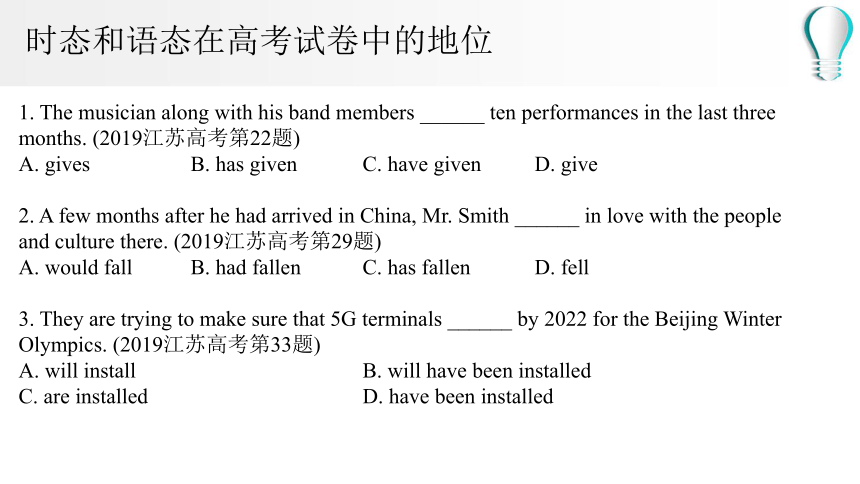
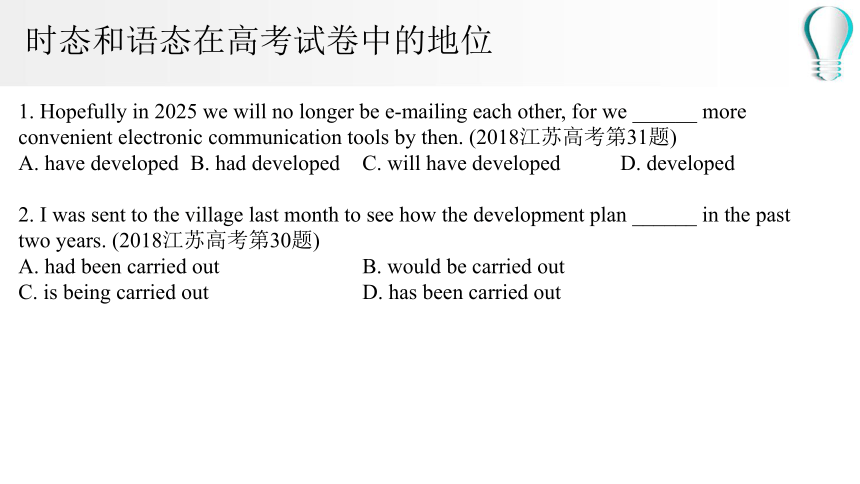
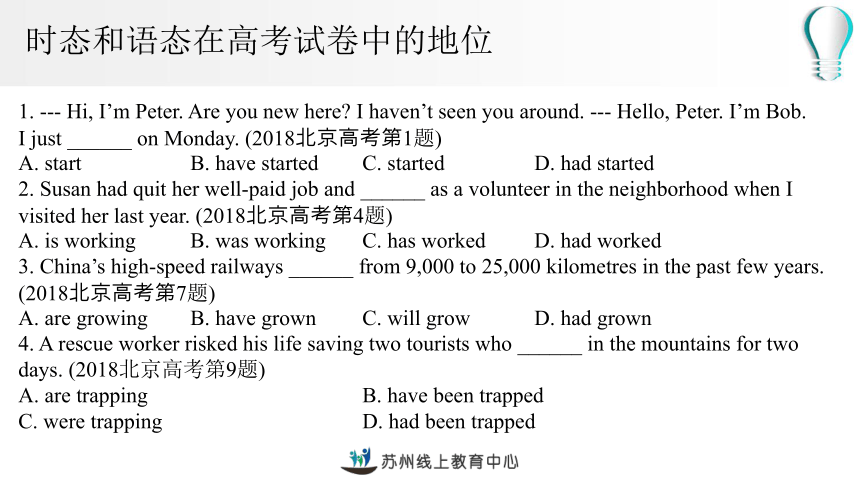
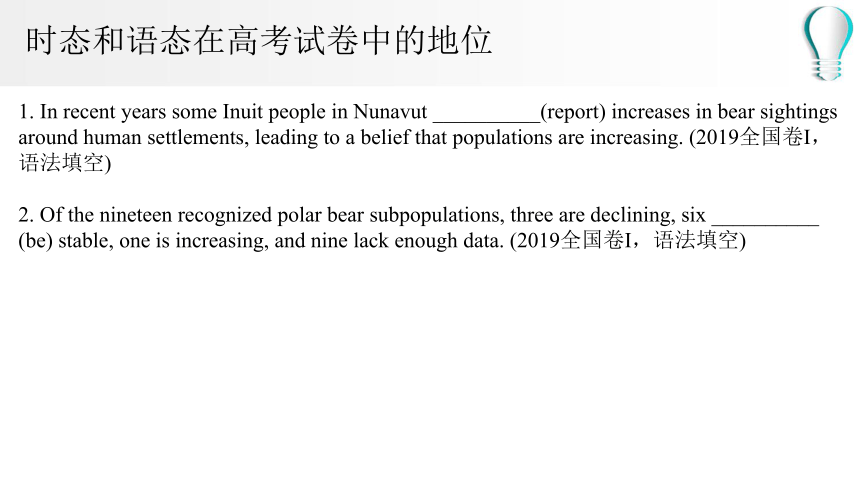

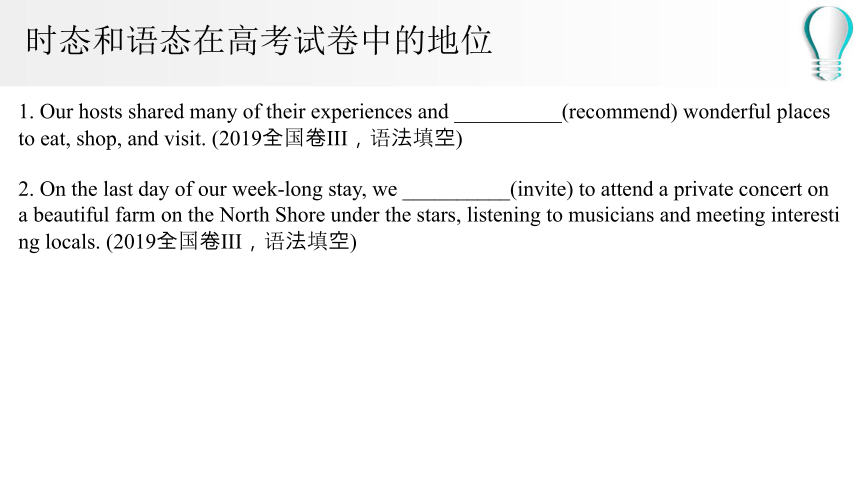


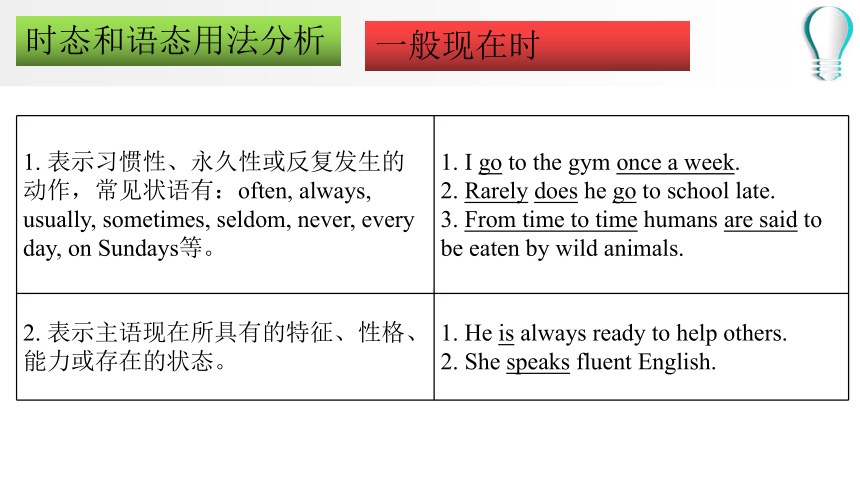
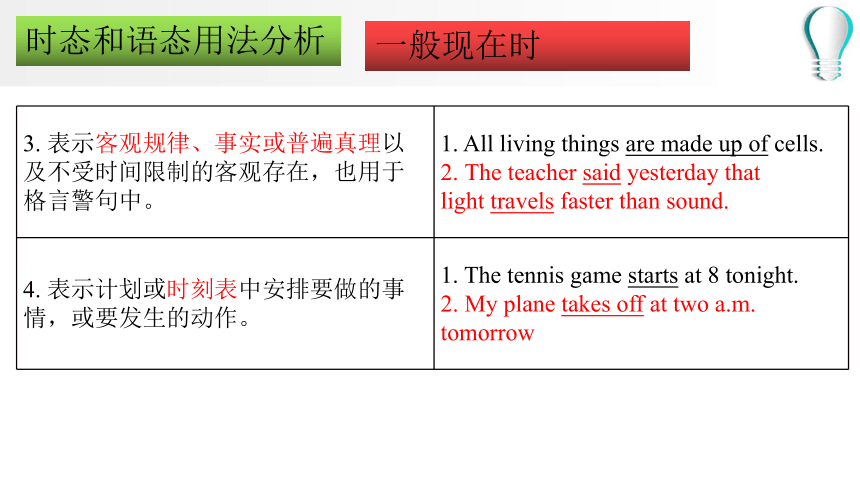
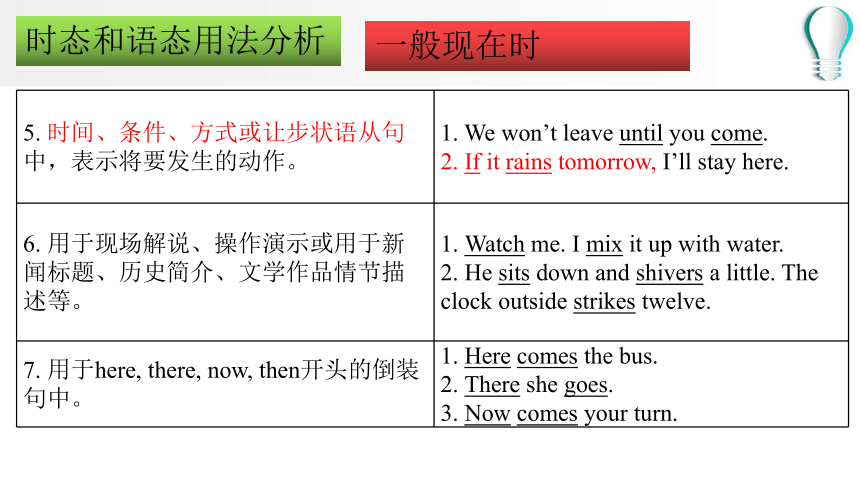
文档简介
(共59张PPT)
高二英语语法复习之时态和语态
时态和语态在高考试卷中的地位
1. The musician along with his band members ______ ten performances in the last three
months. (2019江苏高考第22题)
A. gives B. has given C. have given D. give
2. A few months after he had arrived in China, Mr. Smith ______ in love with the people
and culture there. (2019江苏高考第29题)
A. would fall B. had fallen C. has fallen D. fell
3. They are trying to make sure that 5G terminals ______ by 2022 for the Beijing Winter
Olympics. (2019江苏高考第33题)
A. will install B. will have been installed
C. are installed D. have been installed
时态和语态在高考试卷中的地位
1. Hopefully in 2025 we will no longer be e-mailing each other, for we ______ more
convenient electronic communication tools by then. (2018江苏高考第31题)
A. have developed B. had developed C. will have developed D. developed
2. I was sent to the village last month to see how the development plan ______ in the past
two years. (2018江苏高考第30题)
A. had been carried out B. would be carried out
C. is being carried out D. has been carried out
时态和语态在高考试卷中的地位
1. --- Hi, I’m Peter. Are you new here? I haven’t seen you around. --- Hello, Peter. I’m Bob.
I just ______ on Monday. (2018北京高考第1题)
A. start B. have started C. started D. had started
2. Susan had quit her well-paid job and ______ as a volunteer in the neighborhood when I
visited her last year. (2018北京高考第4题)
A. is working B. was working C. has worked D. had worked
3. China’s high-speed railways ______ from 9,000 to 25,000 kilometres in the past few years. (2018北京高考第7题)
A. are growing B. have grown C. will grow D. had grown
4. A rescue worker risked his life saving two tourists who ______ in the mountains for two
days. (2018北京高考第9题)
A. are trapping B. have been trapped
C. were trapping D. had been trapped
时态和语态在高考试卷中的地位
1. In recent years some Inuit people in Nunavut __________(report) increases in bear sightings around human settlements, leading to a belief that populations are increasing. (2019全国卷I,语法填空)
2. Of the nineteen recognized polar bear subpopulations, three are declining, six __________
(be) stable, one is increasing, and nine lack enough data. (2019全国卷I,语法填空)
时态和语态在高考试卷中的地位
1. Picking up her “Lifetime Achievement” award, proud Irene __________(declare) she had no plans to retire from her 36-year-old business. (2019全国卷II,语法填空)
2. I love coming here and seeing my family and all the friends I __________(make) over the
years. (2019全国卷II,语法填空)
时态和语态在高考试卷中的地位
1. Our hosts shared many of their experiences and __________(recommend) wonderful places to eat, shop, and visit. (2019全国卷III,语法填空)
2. On the last day of our week-long stay, we __________(invite) to attend a private concert on a beautiful farm on the North Shore under the stars, listening to musicians and meeting interesting locals. (2019全国卷III,语法填空)
2019全国卷1书面表达
Dear Sir,
I am Li Hua, a student studying in London, who is more than thrilled to be informed of the message that there will be a Chinese painting exhibition in your local art gallery. I am writing
to apply for being a volunteer.
As a student from China, I have been keen on Chinese paintings. As you know, China has a
growing influence on today's world. In the meanwhile, more attention is paid to the study of
the traditional culture in Chinese high schools. So I have got the hang of the knowledge of
Chinese paintings. By the way, I can also do well in communicating with others in oral English.
I would extrmely appreciate it if I have a chance to receive your approval.
Looking forward to your early reply.
Yours,
Li Hua
时态和语态在高考试卷中的地位
结论:只要有句子,就要用到时态,所以时态很重要!!!
什么时态最重要?没有定论!都重要!!!
时态和语态在高考试卷中的地位
时态和语态用法分析
一般现在时
1. 表示习惯性、永久性或反复发生的动作,常见状语有:often, always,
usually, sometimes, seldom, never, every day, on Sundays等。 1. I go to the gym once a week.
2. Rarely does he go to school late.
3. From time to time humans are said to
be eaten by wild animals.
2. 表示主语现在所具有的特征、性格、能力或存在的状态。 1. He is always ready to help others.
2. She speaks fluent English.
时态和语态用法分析
一般现在时
3. 表示客观规律、事实或普遍真理以及不受时间限制的客观存在,也用于格言警句中。 1. All living things are made up of cells.
2. The teacher said yesterday that
light travels faster than sound.
4. 表示计划或时刻表中安排要做的事情,或要发生的动作。 1. The tennis game starts at 8 tonight.
2. My plane takes off at two a.m.
tomorrow
时态和语态用法分析
一般现在时
5. 时间、条件、方式或让步状语从句中,表示将要发生的动作。 1. We won’t leave until you come.
2. If it rains tomorrow, I’ll stay here.
6. 用于现场解说、操作演示或用于新闻标题、历史简介、文学作品情节描述等。 1. Watch me. I mix it up with water.
2. He sits down and shivers a little. The
clock outside strikes twelve.
7. 用于here, there, now, then开头的倒装句中。 1. Here comes the bus.
2. There she goes.
3. Now comes your turn.
时态和语态用法分析
一般现在时
【典型例题】
1. Of the nineteen recognized polar bear subpopulations, three are declining, six ___are___
(be) stable, one is increasing, and nine lack enough data. (2019全国卷I,语法填空)
2. While running regularly can't make you live forever, the review says it __is__(be) more
effective at lengthening life than walking, cycling or swimming. (2018全国卷I,语法
填空)
3. When fat and salt __are removed__(remove) from food, the food tastes as if it is missing
something. As a result, people will eat more food to try to make up for that something
missing. (2017全国卷I,语法填空)
时态和语态用法分析
一般过去时
1. 表示过去某一具体时间发生的动作或存在的状态,常与表示过去的时间状语连用。 1. I met an old friend the other day.
2. He got injured at work yesterday.
3. I saw her come back just now.
2. 表示过去一段时间内经常或反复发生的动作,通常由一个表示过去的大时间限定。 1. As a child, I couldn’t do whatever I
wanted to.
2. I often visited her two years ago.
时态和语态用法分析
一般过去时
3. 在大时间为过去的背景下,时间、条件、方式或让步状语从句中常用一般过去时表示过去将来的动作。 1. She told me that she would come if I
promised to wait for her.
2. He said when the manager came back, he would send me a message.
4. 在没有时间状语的情况下,依据上下文或符合逻辑的过去的时间所发生的动作。 1. Could you please repeat your address? I didn’t quite catch it.
2. The novel was written by Lu Xun.
时态和语态用法分析
一般过去时
5. 以下时间状语也可以用一般过去时:today, tonight, this morning, this week,
this month, this year等。 1. Did you get any mail today?
2. I saw him in the shopping mall this
afternoon.
6. since引导的时间状语从句和“It’s
time that从句”常用一般过去时。 1. It’s two years since he went away.
2. It’s time that we had dinner.
时态和语态用法分析
一般过去时
【典型例题】
1. Picking up her “Lifetime Achievement” award, proud Irene __declared__(declare) she had
no plans to retire from her 36-year-old business. (2019全国卷II,语法填空)
2. Our hosts shared many of their experiences and __recommended_(recommend) wonderful
places to eat, shop, and visit. (2019全国卷III,语法填空)
3. On the last day of our week-long stay, we __were invited__(invite) to attend a private
concert on a beautiful farm on the North Shore under the stars, listening to musicians and
meeting interesting locals. (2019全国卷III,语法填空)
时态和语态用法分析
一般将来时
1. 以现在为基准,表示将要发生的动作(英国英语中第一人称常用shall,美国英语中各人称均用will),常与表示一般将来的时间状语连用,如tomorrow, next year等。 1. No one knows what will happen in the future.
2. He won’t go to visit his parents next
week.
3. I shall know more as time goes on.
2. 以现在为基准,表示将来经常发生的动作、情况或状态。 1. If I’m not so busy, I will come to see
you every weekend.
2. I shall come as often as possible.
时态和语态用法分析
一般将来时
3. “will”表将来的三种情况:
(1) (按自然规律)将、必然会;
(2) 事先没有考虑而临时作出决定;
(3) 表示事物的倾向性或规律性。 1. Man will die. 人终有一死。
2. It’s going to rain. I’ll go home to close the windows.
3. Boys will be boys. 男孩终究是男孩(改不了男孩子特有的习惯)。
4. “be going to”表将来的两种情况:
(1) 打算做某事;
(2) 某客观迹象预示某事即将发生。 1. —Ann’s in hospital. —I know that.
I’m going to visit her tomorrow.
2. The boat is leaking! It’s going to sink.
时态和语态用法分析
一般将来时
5. “be to do”表示将来的三种情况:
(1) 计划、安排要做的事;
(2) 按命令、要求、约定或义务该做的事;
(3) 表示假设或意图(常用于条件状语从句中)。 1. The conference is to be held next
Saturday.
2. No one is to leave here without
permission.
3. If you are to study abroad, you must
learn English well.
6. “be about to do”表示马上要做某事,除与“when”连用外不与其他时间状语连用。 1. Hurry! The bus is about to leave.
2. I’m not about to stop when I’m so
close to success.
成功在望,我岂能罢手?
时态和语态用法分析
一般将来时
7. “be due to do”表示按时间表要做的事或计划中设定要做的事。 1. The flight is due to leave at 8 a.m.
2. Your work is due to be finished by
Friday.
8. “will do”也常用于“祈使句+and/or+
you+will do sth”的句型中。 1. Keep on working hard and you’ll
succeed sooner or later.
2. Hurry up, or you’ll be late.
时态和语态用法分析
【典型例题】近几年高考卷对此时态的考查不多!
1. (2016江苏22) More efforts, as reported, _____ in the years ahead to accelerate the supply-side structural reform.
A. are made B. will be made C. are being made D. have been made
2. (2016北京30) The students have been working hard on their lessons and their efforts ____ with success in the end.
A. rewarded B. were rewarded C. will reward D. will be rewarded
3. (2015北京30) ---Dr. Jackson is not in his office at the moment.
---All right. I ______ him later.
A. will call B. have called C. call D. will be calling
一般将来时
时态和语态用法分析
现在进行时
1. 表示现在某个时刻正在进行的动作,常见时间状语有:now, right now, at this moment等,或由look, listen等引出的表示说话当时的语境。 1. The telephone is ringing. Would you
answer it, please?
2. My radio is being repaired now.
3. Hurry up! We are all waiting for you.
2. 表示现在某段时间内持续进行的动作,常见时间状语有:these days, this week (month, term, ...), at present等。 1. —What is he doing in Beijing these
days? —He is attending an international conference.
2. She is working for a company at
present.
时态和语态用法分析
现在进行时
3. 与always, constantly, continually,
forever, all the time等连用,表示说话人对主语的行为持有或好或坏的感彩。 1. He’s always asking silly questions.
2. Conditions are changing all the time.
3. She is always helping others.
4. 表示位置移动的词,如begin, start,
go, come, leave, arrive, stay等,可用现在进行时表示近期内将要发生的动作。 1. They are leaving for Paris this
afternoon.
2. Stay here and wait! The bus is arriving soon.
5. “are/is being+形容词”表示主语暂时出现的某种情况或品质。 1. The boy is being naughty again.
2. You are being foolish.
时态和语态用法分析
【典型例题】高考卷对此时态的考查几乎没有!
1. (2018天津13) My washing machine ______ this week, so I have to wash my clothes by
hand.
A. was repaired B. is repaired C. is being repaired D. has been repaired
2. (2014北京22) ---Hi, let’s go skating.
---Sorry, I’m busy right now. I ______ in an application form for a new job.
A. fill B. have filled C. am filling D. will fill
3. (2013天津13) The water supply has been cut off temporarily because the workers ______ one of the main pipes.
A. had repaired B. have repaired C. repaired D. are repairing
现在进行时
时态和语态用法分析
过去进行时
1. 表示过去某个时刻正在进行的动作,常见时间状语有:at that time, at this
time yesterday, when I arrived等。 1. —What were you doing at 4 p.m.
yesterday? —I was writing an essay.
2. When he called me, I was having
dinner.
2. 表示过去某段时间内持续进行的动作。 1. I was studying abroad from 1990 to
1994.
2. I was tidying my bedroom the whole morning.
时态和语态用法分析
过去进行时
3. 同现在进行时相似,与always,
constantly, continually, forever, all the
time等连用,表示说话人对主语的行为持有或好或坏的感彩。 1. She was always being late for school when she was a school girl.
2. He was constantly playing games
while in college.
4. 与现在进行时相似,表示位置移动的词,如begin, start, go, come, leave,
arrive, stay等,可用过去进行时表示近期内将要发生的动作。 1. He told me that he was leaving for
Paris the next day.
2. Mother asked me whether I was
coming back for lunch.
时态和语态用法分析
过去进行时
5. 表示过去打算进行但未实现的动作,后面常跟一个由but引导的句子,表示转折的语气。 1. They were expecting you the whole
day, but you didn’t turn up.
2. I was coming, but an old friend of
mine came to see me.
6. 在表示过去的复合句中,延续时间较长的动作常用过去进行时,而另一动作常用一般过去时。 1. He fell asleep when he was reading.
2. I was walking in the street when someone called me.
3. She didn’t hear the phone because she was listening to the radio.
时态和语态用法分析
过去进行时
7. 直接引语中,为表示委婉或不确定,有时也用过去进行。常见动词有hope, wonder, think, expect等。 1. I was wondering if you would like to
come to my party.
2. I was thinking maybe he could go by
taxi.
时态和语态用法分析
【典型例题】
1. (2018北京4) Susan had quit her well-paid job and ____ as a volunteer in the neighborhood when I visited her last year.
A. is working B. was working C. has worked D. had worked
2. (2017江苏27) He hurried home, never once looking back to see if he ______.
A. was being followed B. was following
C. had been followed D. followed
3. (2017天津8) I _____ down to London when I suddenly found that I was on the wrong road.
A. was driving B. have driven C. would drive D. drove
过去进行时
时态和语态用法分析
将来进行时
1. 以现在时间为基准,发生在将来某点时间的动作。 I will be attending a meeting this time
tomorrow.
2. 以现在时间为基准,在将来某段时间内持续进行的动作。 We’ll be watching a football match from 9 to 11 tonight.
3. 委婉询问对方计划。 Will you be travelling this weekend?
时态和语态用法分析
将来进行时
【典型例题】高考卷对此时态的考查几乎没有!
1. (2015天津6) Jane can’t attend the meeting at 3 o’clock this afternoon because she ______ a class at that time.
A. will teach B. would teach C. has taught D. will be teaching
2. (2013江苏25) ---Could I use your car tomorrow morning? ---Sure. I ______ a report at
home.
A. will be writing B. will have written C. have written D. have been writing
3. (2012辽宁31) I feel so excited! At this time tomorrow morning I ______ to Shanghai.
A. will be flying B. will fly C. have been flying D. have flown
时态和语态用法分析
现在完成时
1. 表示过去发生的或说话之前已完成的某一动作对现在造成的影响或结果,不具体涉及动作发生的时间。常与
already, never, ever, before, just, not ...
yet, still, recentl, lately等连用。 1. The rain has already stopped.
2. —Have you ever been to London?
—No, I have never been there.
3. My task hasn’t been finished yet.
4. There have been some changes in my
hometown lately.
2. 表示过去某时开始一直持续到现在的动作或状态,该动作也许已终止,也许还会持续。常与表示段时间的状语连用,如since sb did sth, for five
years, so far, up to now等。 1. He has worn glasses since his
childhood.
2. We have lived here for five years.
3. So far he has been to 30 countries.
4. I have read two books this week.
时态和语态用法分析
现在完成时
3. 用在时间、条件、原因等状语从句中,代替将来完成时,表示从句的动作先于主句的动作完成。 1. Once you have made a promise, you must keep it.
2. I’ll go with you when I have finished my work.
4. 表示反复或习惯性动作,常与
several times, once, twice等词连用。 1. I have met him twice this week.
2. I have seen the film three times.
时态和语态用法分析
现在完成时
5. 时间状语为for the last three weeks, in the recent years, during/ in/over/within
the past few years等时,也常用现在完成时。 1. Great changes have taken place in this city in the last three years.
2. Much progress have been made in
science during the past few years.
6. 在“最高级+名词+定语从句”或“这是第几次+定语从句”两种情况中,定语从句的时态通常用现在完成时。 1. I’m afraid this is the worst movie I
have ever seen.
2. Tom, this is the third time you have
failed in the exam.
时态和语态用法分析
现在完成时
7. 非延续性动词的否定式可以表示延续的状态,可与状语for some
time或since sb did sth连用。 1. I haven’t bought anything for two
weeks.
2. They haven’t left the lab since
yesterday.
8. 有表示段时间的状语时,不可使用非延续性动词的肯定式,必须使用延续性动词的肯定式。 (×) His grandma has died for three years.(√) His grandma has been dead for three years.
时态和语态用法分析
现在完成时
【典型例题】
1. In recent years some Inuit people in Nunavut __have reported__(report) increases in bear
sightings around human settlements, leading to a belief that populations are increasing. (2019全国卷I,语法填空)
2. I love coming here and seeing my family and all the friends I __have made__(make) over
the years. (2019全国卷II,语法填空)
3. Since 2011, the country __has grown__(grow) more corn than rice. (2018全国卷II,语法填空)
时态和语态用法分析
现在完成进行时
1. 表示从过去某时间开始,某动作一直延续到现在(说话时刻或最近刚刚结束的动作)。 1. —Hi, Tracy, you look tired.
—I have been painting the living room.2. —I’m sorry to have kept you waiting
so long.
—That’s nothing. I have been reading a novel.
2. 表示从过去某时间开始,某动作一直延续到现在(说话时刻),并可能继续下去。 1. I have been waiting for her for an hour, but she hasn’t turned up yet.
2. He’s ill. He’s been lying in bed for
two days.
时态和语态用法分析
【典型例题】
1. (2016江苏29) Dashan, who ______ crosstalk, the Chinese comedic tradition, for decades, wants to mix it up with the Western stand-up tradition.
A. will be learning B. is learning C. had been learning D. has been learning
2. (2016北京23) ---Excuse me, which movie are you waiting for?
---The new Star Wars. We ______ here for more than two hours.
A. waited B. wait C. would be waiting D. have been waiting
3. (2015福建30) ---Where is Peter? I can’t find him anywhere.
---He went to the library after breakfast and ______ his essay there ever since.
A. wrote B. had written C. has been writing D. is writing
现在完成进行时
时态和语态用法分析
过去完成时
1. 表示到过去某一时刻为止已完成的动作,常与“by+过去时间”连用,通常使用非延续性动词。 1. By the end of last year, we had learned about 2,000 English words.
2. By the time I got home, everyone had gone to bed.
2. 表示一个动作在另一个过去的动作之前已完成。常与“before/ when+过去时间”连用。 1. The film had already begun when we
arrived at the cinema.
2. They had worked for two hours before I got there.
时态和语态用法分析
过去完成时
3. 过去完成时也常用于主句是一般过去时的宾语从句中。 She realized that she had left the keys at home.
4. 表示过去本要做而未做成,常见动词有hope, want, expect, think, mean,
plan, suppose, intend等。 We had planned to go on a picnic
yesterday, but it was raining.
5. 在“hardly/scarcely/rarely...when”和
“no sooner...than”两个句型中,主句常用过去完成时。 Hardly had he finished his job when the boss came in.
= He had hardly finished his job when
the boss came in.
他一完成工作老板就走了进来。
时态和语态用法分析
【典型例题】
1. (2018江苏30) I was sent to the village last month to see how the development plan ______ in the past two years.
A. had been carried out B. would be carried out
C. is being carried out D. has been carried out
2. (2018北京9) A rescue worker risked his life saving two tourists who ______ in the
mountains for two days.
A. are trapping B. have been trapped
C. were trapping D. had been trapped
3. (2017北京29) In the 1950s in the USA, most families had just one phone at home, and
wireless phones ______ yet.
A. haven’t invented B. haven’t been invented
C. hadn’t invented D. hadn’t been invented
过去完成时
时态和语态用法分析
过去完成进行时
与现在完成进行时相似,过去完成进行时表示在过去某时间点之前一直在进行的动作,到这个时间点为止,该动作也许已完成,也许还会持续下去。 1. The fans had been waiting for almost
two hours before the star finally arrived.
2. He had been reading for about an hour when the telephone rang.
此时态高考不作要求!
时态和语态用法分析
将来完成时
以现在时间为基准,到将来某时间点为止已完成的动作,常与“by+将来时间”连用。 1. By next July, I’ll have graduated.
2. By the time you come back, we will
have finished our work.
时态和语态用法分析
【典型例题】
1. (2019江苏33) They are trying to make sure that 5G terminals ______ by 2022 for the
Beijing Winter Olympics.
A. will install B. will have been installed
C. are installed D. have been installed
2. (2018江苏31) Hopefully in 2025 we will no longer be e-mailing each other, for we ______ more convenient electronic communication tools by then.
A. have developed B. had developed C. will have developed D. developed
此时态只出现在2018年和2019年的江苏高考中。
将来完成时
时态和语态用法分析
过去将来时
1. 过去将来时常用在宾语从句中,表示从过去的观点看,在将来发生的行为或存在的状态,表示从句动作发生在主句之后。 1. He said he would wait for us at the
station.
2. I thought he would accept the
invitation, but he refused.
2. would do sth可表示过去的习惯性动作。 Whenever I had trouble, he would come
to my aid.
时态和语态用法分析
过去将来时
3. were/was going to do表示过去的打算。 Last Sunday we were going to have a
picnic, but it rained hard.
4. were/was about to do或were/was on
the point of doing表示“正要做某事”,常与when连用。 I was about to go to bed when the phone rang.
= I was on the point of going to bed
when the phone rang.
5. were/was to do表示计划或安排做某事,也可表示“预料到会...”。 1. He said the meeting was to be held
next Friday.
2. No one knew Chaplin was to be
famous when he was a child.
时态和语态用法分析
【典型例题】此时态高考较少考到!
1. (2015浙江8) Albert Einstein was born in 1879. As a child, few people guessed that he ___ a famous scientist whose theories would change the world.
A. has been B. had been C. was going to be D. was
2. (2015陕西24) At college, Barack Obama didn’t know that he ______ the first black
president of the United States of America.
A. was to become B. becomes C. is to become D. became
3. (2014山东5) They made up their mind that they _____ a new house once Larry changed
jobs.
A. bought B. would buy C. have bought D. had bought
过去将来时
易混淆时态区别
一般过去时VS现在完成时
* 现在完成时强调过去发生的某一动作对现在造成的影响或结果,强调的是现在的情况。
* 一般过去时单纯表示过去的动作或状态,和现在不发生联系。 1. I have seen the film.
(表示对电影内容有了了解或者不想再看了等等,对现在有影响。)
I saw the film last week.
(不对现在产生影响)
2. Have you had lunch?
(没吃过的话就招待你吃点或什么的)
Did you have lunch?
(随便问问)
易混淆时态区别
一般过去时VS现在完成时
【典型例题】
1. ---Where _______ my book? I can't see it anywhere.
--- I _______ it on this table. But now it's gone .
A. were you putting; have put B. had you put; was putting
C. have you put; put D. did you put; have put
2. ---What about your self-drive trip yesterday?
---Tiring! The road is being widened, and we ______ a rough ride.
A. had B. have C. would have D. have had
易混淆时态区别
一般过去时VS现在完成时
【典型例题】
1. ---Where _______ my book? I can't see it anywhere.
--- I _______ it on this table. But now it's gone .
A. were you putting; have put B. had you put; was putting
C. have you put; put D. did you put; have put
答案C
【解析】上半句“---Where have you put my book?”用现在完成时,表示对现在产生影响,表示说话者希望你能告诉他答案。如果用一般过去时,则表示说话者只是随便问问,你知不知道他都无所谓。
下半句“I put it on this table.”用一般过去时,表示说话者当时把书放在了桌上,后面
“But now it's gone”(现在它不见了)呼应前面内容,与过去作对比。
易混淆时态区别
一般过去时VS现在完成时
【典型例题】
2. ---What about your self-drive trip yesterday?
---Tiring! The road is being widened, and we ______ a rough ride.
A. had B. have C. would have D. have had
答案A
【解析】上半句的时间状语“yesterday”很重要,表示对话内容的基调是一般过去,从而决定了空格处的时态。
下半句的参照动作“is being widened”表示这条路目前仍处于被拓宽状态(昨天这样今天这样明天仍这样),但“had a rough ride”应该是对应“yesterday”的,而不是与“is
being widened”相对应,所以不能用现在完成时。
易混淆时态区别
现在完成时VS现在完成进行时
* 非延续性动词的现在完成时强调结果或动作已完成并已终止。
* 延续性动词的现在完成时强调结果或动作已完成,也可能持续下去。
* 如果强调某结果或动作从过去某点时间开始一直在进行,且有可能持续下去,则更多使用现在完成进行时(一般只用延续性动词)。 1. It’s no use hurrying. The train has
already left.
2. He has lived here for three years. (也许已不住,也许仍住。)
3. He has been living here for three
years.
(强调仍住这儿,且还会住下去)
易混淆时态区别
现在完成时VS现在完成进行时
【典型例题】
1. ---It's said that he ______ a novel recently.
---Right. I've just got a newly-published version of the novel.
A. is writing B. had written
C. has been writing D. has written
2. The manager ______ the workers how to improve the program since 9 am.
A. has told B. is telling
C. has been telling D. will have told
易混淆时态区别
现在完成时VS现在完成进行时
【典型例题】
1. ---It's said that he ______ a novel recently.
---Right. I've just got a newly-published version of the novel.
A. is writing B. had written
C. has been writing D. has written
答案D
【解析】根据语境,该小说已写完并已被出版,故用现在完成时,表示动作已完成。
而“has been writing”则表示小说还未写完,不符合语境。
易混淆时态区别
现在完成时VS现在完成进行时
【典型例题】
2. The manager ______ the workers how to improve the program since 9 am.
A. has told B. is telling
C. has been telling D. will have told
答案C
【解析】根据时间状语“since 9 am”可以确定用现在完成时态,但“has told”表示动作已完成,而用“has been telling”表示“一直在讲述”,更符合语境。
巩固练习
1. It was raining lightly when I __________(arrive) in Yangshuo just before dawn. (2015全国卷I,语法填空)
2. Yangshuo __________(be) really beautiful. A study of travelers conducted by the website
TripAdvisor names Yangshuo as one of the top 10 destinations in the world. (2015全国卷I,语法填空)
3. This cycle __________(go) day after day: The walls warm up during the day and cool off
during the night and are thus always a timely offset(抵消) for the outside temperatures. (2015全国卷II,语法填空)
4. In 1969, the pollution was terrible along the Cuyahoga River Cleveland, Ohio. It _______(be) unimaginable that it could ever be cleaned up. (2014全国卷I,语法填空)
5. A boy on a bike ____________(catch) my attention. He was riding beside the bus and
waving his arms. (2014全国卷II,语法填空)
arrived
is
goes
was
caught
巩固练习
6. One day, Nick invited his friends to supper. He was cooking some delicious food in the
kitchen. Suddenly he __________(find) that he had run out of salt. (2013广东卷,语法填空)
7. He suddenly appeared in class one day, wearing sunglasses. He walked in as if he _______(buy) the school. (2012广东卷,语法填空)
8. I got on the bus and found a seat near the back, and then I noticed a man sitting at the front. He __________(pretend) that a tiger toy was real and giving it a voice. (2011广东卷,语法填空)
9. I __________(voice) my biggest concern to my mother, “How will I make friends?” She
handed me advice, “Be yourself.” (2019北京卷,语法填空)
10. Does the name of the college you attend really matter? Research on the question ______ (suggest) that, for most students, it doesn't. (2019北京卷,语法填空)
found
had bought
pretended
voiced
suggests
suggested
has suggested
高二英语语法复习之时态和语态
时态和语态在高考试卷中的地位
1. The musician along with his band members ______ ten performances in the last three
months. (2019江苏高考第22题)
A. gives B. has given C. have given D. give
2. A few months after he had arrived in China, Mr. Smith ______ in love with the people
and culture there. (2019江苏高考第29题)
A. would fall B. had fallen C. has fallen D. fell
3. They are trying to make sure that 5G terminals ______ by 2022 for the Beijing Winter
Olympics. (2019江苏高考第33题)
A. will install B. will have been installed
C. are installed D. have been installed
时态和语态在高考试卷中的地位
1. Hopefully in 2025 we will no longer be e-mailing each other, for we ______ more
convenient electronic communication tools by then. (2018江苏高考第31题)
A. have developed B. had developed C. will have developed D. developed
2. I was sent to the village last month to see how the development plan ______ in the past
two years. (2018江苏高考第30题)
A. had been carried out B. would be carried out
C. is being carried out D. has been carried out
时态和语态在高考试卷中的地位
1. --- Hi, I’m Peter. Are you new here? I haven’t seen you around. --- Hello, Peter. I’m Bob.
I just ______ on Monday. (2018北京高考第1题)
A. start B. have started C. started D. had started
2. Susan had quit her well-paid job and ______ as a volunteer in the neighborhood when I
visited her last year. (2018北京高考第4题)
A. is working B. was working C. has worked D. had worked
3. China’s high-speed railways ______ from 9,000 to 25,000 kilometres in the past few years. (2018北京高考第7题)
A. are growing B. have grown C. will grow D. had grown
4. A rescue worker risked his life saving two tourists who ______ in the mountains for two
days. (2018北京高考第9题)
A. are trapping B. have been trapped
C. were trapping D. had been trapped
时态和语态在高考试卷中的地位
1. In recent years some Inuit people in Nunavut __________(report) increases in bear sightings around human settlements, leading to a belief that populations are increasing. (2019全国卷I,语法填空)
2. Of the nineteen recognized polar bear subpopulations, three are declining, six __________
(be) stable, one is increasing, and nine lack enough data. (2019全国卷I,语法填空)
时态和语态在高考试卷中的地位
1. Picking up her “Lifetime Achievement” award, proud Irene __________(declare) she had no plans to retire from her 36-year-old business. (2019全国卷II,语法填空)
2. I love coming here and seeing my family and all the friends I __________(make) over the
years. (2019全国卷II,语法填空)
时态和语态在高考试卷中的地位
1. Our hosts shared many of their experiences and __________(recommend) wonderful places to eat, shop, and visit. (2019全国卷III,语法填空)
2. On the last day of our week-long stay, we __________(invite) to attend a private concert on a beautiful farm on the North Shore under the stars, listening to musicians and meeting interesting locals. (2019全国卷III,语法填空)
2019全国卷1书面表达
Dear Sir,
I am Li Hua, a student studying in London, who is more than thrilled to be informed of the message that there will be a Chinese painting exhibition in your local art gallery. I am writing
to apply for being a volunteer.
As a student from China, I have been keen on Chinese paintings. As you know, China has a
growing influence on today's world. In the meanwhile, more attention is paid to the study of
the traditional culture in Chinese high schools. So I have got the hang of the knowledge of
Chinese paintings. By the way, I can also do well in communicating with others in oral English.
I would extrmely appreciate it if I have a chance to receive your approval.
Looking forward to your early reply.
Yours,
Li Hua
时态和语态在高考试卷中的地位
结论:只要有句子,就要用到时态,所以时态很重要!!!
什么时态最重要?没有定论!都重要!!!
时态和语态在高考试卷中的地位
时态和语态用法分析
一般现在时
1. 表示习惯性、永久性或反复发生的动作,常见状语有:often, always,
usually, sometimes, seldom, never, every day, on Sundays等。 1. I go to the gym once a week.
2. Rarely does he go to school late.
3. From time to time humans are said to
be eaten by wild animals.
2. 表示主语现在所具有的特征、性格、能力或存在的状态。 1. He is always ready to help others.
2. She speaks fluent English.
时态和语态用法分析
一般现在时
3. 表示客观规律、事实或普遍真理以及不受时间限制的客观存在,也用于格言警句中。 1. All living things are made up of cells.
2. The teacher said yesterday that
light travels faster than sound.
4. 表示计划或时刻表中安排要做的事情,或要发生的动作。 1. The tennis game starts at 8 tonight.
2. My plane takes off at two a.m.
tomorrow
时态和语态用法分析
一般现在时
5. 时间、条件、方式或让步状语从句中,表示将要发生的动作。 1. We won’t leave until you come.
2. If it rains tomorrow, I’ll stay here.
6. 用于现场解说、操作演示或用于新闻标题、历史简介、文学作品情节描述等。 1. Watch me. I mix it up with water.
2. He sits down and shivers a little. The
clock outside strikes twelve.
7. 用于here, there, now, then开头的倒装句中。 1. Here comes the bus.
2. There she goes.
3. Now comes your turn.
时态和语态用法分析
一般现在时
【典型例题】
1. Of the nineteen recognized polar bear subpopulations, three are declining, six ___are___
(be) stable, one is increasing, and nine lack enough data. (2019全国卷I,语法填空)
2. While running regularly can't make you live forever, the review says it __is__(be) more
effective at lengthening life than walking, cycling or swimming. (2018全国卷I,语法
填空)
3. When fat and salt __are removed__(remove) from food, the food tastes as if it is missing
something. As a result, people will eat more food to try to make up for that something
missing. (2017全国卷I,语法填空)
时态和语态用法分析
一般过去时
1. 表示过去某一具体时间发生的动作或存在的状态,常与表示过去的时间状语连用。 1. I met an old friend the other day.
2. He got injured at work yesterday.
3. I saw her come back just now.
2. 表示过去一段时间内经常或反复发生的动作,通常由一个表示过去的大时间限定。 1. As a child, I couldn’t do whatever I
wanted to.
2. I often visited her two years ago.
时态和语态用法分析
一般过去时
3. 在大时间为过去的背景下,时间、条件、方式或让步状语从句中常用一般过去时表示过去将来的动作。 1. She told me that she would come if I
promised to wait for her.
2. He said when the manager came back, he would send me a message.
4. 在没有时间状语的情况下,依据上下文或符合逻辑的过去的时间所发生的动作。 1. Could you please repeat your address? I didn’t quite catch it.
2. The novel was written by Lu Xun.
时态和语态用法分析
一般过去时
5. 以下时间状语也可以用一般过去时:today, tonight, this morning, this week,
this month, this year等。 1. Did you get any mail today?
2. I saw him in the shopping mall this
afternoon.
6. since引导的时间状语从句和“It’s
time that从句”常用一般过去时。 1. It’s two years since he went away.
2. It’s time that we had dinner.
时态和语态用法分析
一般过去时
【典型例题】
1. Picking up her “Lifetime Achievement” award, proud Irene __declared__(declare) she had
no plans to retire from her 36-year-old business. (2019全国卷II,语法填空)
2. Our hosts shared many of their experiences and __recommended_(recommend) wonderful
places to eat, shop, and visit. (2019全国卷III,语法填空)
3. On the last day of our week-long stay, we __were invited__(invite) to attend a private
concert on a beautiful farm on the North Shore under the stars, listening to musicians and
meeting interesting locals. (2019全国卷III,语法填空)
时态和语态用法分析
一般将来时
1. 以现在为基准,表示将要发生的动作(英国英语中第一人称常用shall,美国英语中各人称均用will),常与表示一般将来的时间状语连用,如tomorrow, next year等。 1. No one knows what will happen in the future.
2. He won’t go to visit his parents next
week.
3. I shall know more as time goes on.
2. 以现在为基准,表示将来经常发生的动作、情况或状态。 1. If I’m not so busy, I will come to see
you every weekend.
2. I shall come as often as possible.
时态和语态用法分析
一般将来时
3. “will”表将来的三种情况:
(1) (按自然规律)将、必然会;
(2) 事先没有考虑而临时作出决定;
(3) 表示事物的倾向性或规律性。 1. Man will die. 人终有一死。
2. It’s going to rain. I’ll go home to close the windows.
3. Boys will be boys. 男孩终究是男孩(改不了男孩子特有的习惯)。
4. “be going to”表将来的两种情况:
(1) 打算做某事;
(2) 某客观迹象预示某事即将发生。 1. —Ann’s in hospital. —I know that.
I’m going to visit her tomorrow.
2. The boat is leaking! It’s going to sink.
时态和语态用法分析
一般将来时
5. “be to do”表示将来的三种情况:
(1) 计划、安排要做的事;
(2) 按命令、要求、约定或义务该做的事;
(3) 表示假设或意图(常用于条件状语从句中)。 1. The conference is to be held next
Saturday.
2. No one is to leave here without
permission.
3. If you are to study abroad, you must
learn English well.
6. “be about to do”表示马上要做某事,除与“when”连用外不与其他时间状语连用。 1. Hurry! The bus is about to leave.
2. I’m not about to stop when I’m so
close to success.
成功在望,我岂能罢手?
时态和语态用法分析
一般将来时
7. “be due to do”表示按时间表要做的事或计划中设定要做的事。 1. The flight is due to leave at 8 a.m.
2. Your work is due to be finished by
Friday.
8. “will do”也常用于“祈使句+and/or+
you+will do sth”的句型中。 1. Keep on working hard and you’ll
succeed sooner or later.
2. Hurry up, or you’ll be late.
时态和语态用法分析
【典型例题】近几年高考卷对此时态的考查不多!
1. (2016江苏22) More efforts, as reported, _____ in the years ahead to accelerate the supply-side structural reform.
A. are made B. will be made C. are being made D. have been made
2. (2016北京30) The students have been working hard on their lessons and their efforts ____ with success in the end.
A. rewarded B. were rewarded C. will reward D. will be rewarded
3. (2015北京30) ---Dr. Jackson is not in his office at the moment.
---All right. I ______ him later.
A. will call B. have called C. call D. will be calling
一般将来时
时态和语态用法分析
现在进行时
1. 表示现在某个时刻正在进行的动作,常见时间状语有:now, right now, at this moment等,或由look, listen等引出的表示说话当时的语境。 1. The telephone is ringing. Would you
answer it, please?
2. My radio is being repaired now.
3. Hurry up! We are all waiting for you.
2. 表示现在某段时间内持续进行的动作,常见时间状语有:these days, this week (month, term, ...), at present等。 1. —What is he doing in Beijing these
days? —He is attending an international conference.
2. She is working for a company at
present.
时态和语态用法分析
现在进行时
3. 与always, constantly, continually,
forever, all the time等连用,表示说话人对主语的行为持有或好或坏的感彩。 1. He’s always asking silly questions.
2. Conditions are changing all the time.
3. She is always helping others.
4. 表示位置移动的词,如begin, start,
go, come, leave, arrive, stay等,可用现在进行时表示近期内将要发生的动作。 1. They are leaving for Paris this
afternoon.
2. Stay here and wait! The bus is arriving soon.
5. “are/is being+形容词”表示主语暂时出现的某种情况或品质。 1. The boy is being naughty again.
2. You are being foolish.
时态和语态用法分析
【典型例题】高考卷对此时态的考查几乎没有!
1. (2018天津13) My washing machine ______ this week, so I have to wash my clothes by
hand.
A. was repaired B. is repaired C. is being repaired D. has been repaired
2. (2014北京22) ---Hi, let’s go skating.
---Sorry, I’m busy right now. I ______ in an application form for a new job.
A. fill B. have filled C. am filling D. will fill
3. (2013天津13) The water supply has been cut off temporarily because the workers ______ one of the main pipes.
A. had repaired B. have repaired C. repaired D. are repairing
现在进行时
时态和语态用法分析
过去进行时
1. 表示过去某个时刻正在进行的动作,常见时间状语有:at that time, at this
time yesterday, when I arrived等。 1. —What were you doing at 4 p.m.
yesterday? —I was writing an essay.
2. When he called me, I was having
dinner.
2. 表示过去某段时间内持续进行的动作。 1. I was studying abroad from 1990 to
1994.
2. I was tidying my bedroom the whole morning.
时态和语态用法分析
过去进行时
3. 同现在进行时相似,与always,
constantly, continually, forever, all the
time等连用,表示说话人对主语的行为持有或好或坏的感彩。 1. She was always being late for school when she was a school girl.
2. He was constantly playing games
while in college.
4. 与现在进行时相似,表示位置移动的词,如begin, start, go, come, leave,
arrive, stay等,可用过去进行时表示近期内将要发生的动作。 1. He told me that he was leaving for
Paris the next day.
2. Mother asked me whether I was
coming back for lunch.
时态和语态用法分析
过去进行时
5. 表示过去打算进行但未实现的动作,后面常跟一个由but引导的句子,表示转折的语气。 1. They were expecting you the whole
day, but you didn’t turn up.
2. I was coming, but an old friend of
mine came to see me.
6. 在表示过去的复合句中,延续时间较长的动作常用过去进行时,而另一动作常用一般过去时。 1. He fell asleep when he was reading.
2. I was walking in the street when someone called me.
3. She didn’t hear the phone because she was listening to the radio.
时态和语态用法分析
过去进行时
7. 直接引语中,为表示委婉或不确定,有时也用过去进行。常见动词有hope, wonder, think, expect等。 1. I was wondering if you would like to
come to my party.
2. I was thinking maybe he could go by
taxi.
时态和语态用法分析
【典型例题】
1. (2018北京4) Susan had quit her well-paid job and ____ as a volunteer in the neighborhood when I visited her last year.
A. is working B. was working C. has worked D. had worked
2. (2017江苏27) He hurried home, never once looking back to see if he ______.
A. was being followed B. was following
C. had been followed D. followed
3. (2017天津8) I _____ down to London when I suddenly found that I was on the wrong road.
A. was driving B. have driven C. would drive D. drove
过去进行时
时态和语态用法分析
将来进行时
1. 以现在时间为基准,发生在将来某点时间的动作。 I will be attending a meeting this time
tomorrow.
2. 以现在时间为基准,在将来某段时间内持续进行的动作。 We’ll be watching a football match from 9 to 11 tonight.
3. 委婉询问对方计划。 Will you be travelling this weekend?
时态和语态用法分析
将来进行时
【典型例题】高考卷对此时态的考查几乎没有!
1. (2015天津6) Jane can’t attend the meeting at 3 o’clock this afternoon because she ______ a class at that time.
A. will teach B. would teach C. has taught D. will be teaching
2. (2013江苏25) ---Could I use your car tomorrow morning? ---Sure. I ______ a report at
home.
A. will be writing B. will have written C. have written D. have been writing
3. (2012辽宁31) I feel so excited! At this time tomorrow morning I ______ to Shanghai.
A. will be flying B. will fly C. have been flying D. have flown
时态和语态用法分析
现在完成时
1. 表示过去发生的或说话之前已完成的某一动作对现在造成的影响或结果,不具体涉及动作发生的时间。常与
already, never, ever, before, just, not ...
yet, still, recentl, lately等连用。 1. The rain has already stopped.
2. —Have you ever been to London?
—No, I have never been there.
3. My task hasn’t been finished yet.
4. There have been some changes in my
hometown lately.
2. 表示过去某时开始一直持续到现在的动作或状态,该动作也许已终止,也许还会持续。常与表示段时间的状语连用,如since sb did sth, for five
years, so far, up to now等。 1. He has worn glasses since his
childhood.
2. We have lived here for five years.
3. So far he has been to 30 countries.
4. I have read two books this week.
时态和语态用法分析
现在完成时
3. 用在时间、条件、原因等状语从句中,代替将来完成时,表示从句的动作先于主句的动作完成。 1. Once you have made a promise, you must keep it.
2. I’ll go with you when I have finished my work.
4. 表示反复或习惯性动作,常与
several times, once, twice等词连用。 1. I have met him twice this week.
2. I have seen the film three times.
时态和语态用法分析
现在完成时
5. 时间状语为for the last three weeks, in the recent years, during/ in/over/within
the past few years等时,也常用现在完成时。 1. Great changes have taken place in this city in the last three years.
2. Much progress have been made in
science during the past few years.
6. 在“最高级+名词+定语从句”或“这是第几次+定语从句”两种情况中,定语从句的时态通常用现在完成时。 1. I’m afraid this is the worst movie I
have ever seen.
2. Tom, this is the third time you have
failed in the exam.
时态和语态用法分析
现在完成时
7. 非延续性动词的否定式可以表示延续的状态,可与状语for some
time或since sb did sth连用。 1. I haven’t bought anything for two
weeks.
2. They haven’t left the lab since
yesterday.
8. 有表示段时间的状语时,不可使用非延续性动词的肯定式,必须使用延续性动词的肯定式。 (×) His grandma has died for three years.(√) His grandma has been dead for three years.
时态和语态用法分析
现在完成时
【典型例题】
1. In recent years some Inuit people in Nunavut __have reported__(report) increases in bear
sightings around human settlements, leading to a belief that populations are increasing. (2019全国卷I,语法填空)
2. I love coming here and seeing my family and all the friends I __have made__(make) over
the years. (2019全国卷II,语法填空)
3. Since 2011, the country __has grown__(grow) more corn than rice. (2018全国卷II,语法填空)
时态和语态用法分析
现在完成进行时
1. 表示从过去某时间开始,某动作一直延续到现在(说话时刻或最近刚刚结束的动作)。 1. —Hi, Tracy, you look tired.
—I have been painting the living room.2. —I’m sorry to have kept you waiting
so long.
—That’s nothing. I have been reading a novel.
2. 表示从过去某时间开始,某动作一直延续到现在(说话时刻),并可能继续下去。 1. I have been waiting for her for an hour, but she hasn’t turned up yet.
2. He’s ill. He’s been lying in bed for
two days.
时态和语态用法分析
【典型例题】
1. (2016江苏29) Dashan, who ______ crosstalk, the Chinese comedic tradition, for decades, wants to mix it up with the Western stand-up tradition.
A. will be learning B. is learning C. had been learning D. has been learning
2. (2016北京23) ---Excuse me, which movie are you waiting for?
---The new Star Wars. We ______ here for more than two hours.
A. waited B. wait C. would be waiting D. have been waiting
3. (2015福建30) ---Where is Peter? I can’t find him anywhere.
---He went to the library after breakfast and ______ his essay there ever since.
A. wrote B. had written C. has been writing D. is writing
现在完成进行时
时态和语态用法分析
过去完成时
1. 表示到过去某一时刻为止已完成的动作,常与“by+过去时间”连用,通常使用非延续性动词。 1. By the end of last year, we had learned about 2,000 English words.
2. By the time I got home, everyone had gone to bed.
2. 表示一个动作在另一个过去的动作之前已完成。常与“before/ when+过去时间”连用。 1. The film had already begun when we
arrived at the cinema.
2. They had worked for two hours before I got there.
时态和语态用法分析
过去完成时
3. 过去完成时也常用于主句是一般过去时的宾语从句中。 She realized that she had left the keys at home.
4. 表示过去本要做而未做成,常见动词有hope, want, expect, think, mean,
plan, suppose, intend等。 We had planned to go on a picnic
yesterday, but it was raining.
5. 在“hardly/scarcely/rarely...when”和
“no sooner...than”两个句型中,主句常用过去完成时。 Hardly had he finished his job when the boss came in.
= He had hardly finished his job when
the boss came in.
他一完成工作老板就走了进来。
时态和语态用法分析
【典型例题】
1. (2018江苏30) I was sent to the village last month to see how the development plan ______ in the past two years.
A. had been carried out B. would be carried out
C. is being carried out D. has been carried out
2. (2018北京9) A rescue worker risked his life saving two tourists who ______ in the
mountains for two days.
A. are trapping B. have been trapped
C. were trapping D. had been trapped
3. (2017北京29) In the 1950s in the USA, most families had just one phone at home, and
wireless phones ______ yet.
A. haven’t invented B. haven’t been invented
C. hadn’t invented D. hadn’t been invented
过去完成时
时态和语态用法分析
过去完成进行时
与现在完成进行时相似,过去完成进行时表示在过去某时间点之前一直在进行的动作,到这个时间点为止,该动作也许已完成,也许还会持续下去。 1. The fans had been waiting for almost
two hours before the star finally arrived.
2. He had been reading for about an hour when the telephone rang.
此时态高考不作要求!
时态和语态用法分析
将来完成时
以现在时间为基准,到将来某时间点为止已完成的动作,常与“by+将来时间”连用。 1. By next July, I’ll have graduated.
2. By the time you come back, we will
have finished our work.
时态和语态用法分析
【典型例题】
1. (2019江苏33) They are trying to make sure that 5G terminals ______ by 2022 for the
Beijing Winter Olympics.
A. will install B. will have been installed
C. are installed D. have been installed
2. (2018江苏31) Hopefully in 2025 we will no longer be e-mailing each other, for we ______ more convenient electronic communication tools by then.
A. have developed B. had developed C. will have developed D. developed
此时态只出现在2018年和2019年的江苏高考中。
将来完成时
时态和语态用法分析
过去将来时
1. 过去将来时常用在宾语从句中,表示从过去的观点看,在将来发生的行为或存在的状态,表示从句动作发生在主句之后。 1. He said he would wait for us at the
station.
2. I thought he would accept the
invitation, but he refused.
2. would do sth可表示过去的习惯性动作。 Whenever I had trouble, he would come
to my aid.
时态和语态用法分析
过去将来时
3. were/was going to do表示过去的打算。 Last Sunday we were going to have a
picnic, but it rained hard.
4. were/was about to do或were/was on
the point of doing表示“正要做某事”,常与when连用。 I was about to go to bed when the phone rang.
= I was on the point of going to bed
when the phone rang.
5. were/was to do表示计划或安排做某事,也可表示“预料到会...”。 1. He said the meeting was to be held
next Friday.
2. No one knew Chaplin was to be
famous when he was a child.
时态和语态用法分析
【典型例题】此时态高考较少考到!
1. (2015浙江8) Albert Einstein was born in 1879. As a child, few people guessed that he ___ a famous scientist whose theories would change the world.
A. has been B. had been C. was going to be D. was
2. (2015陕西24) At college, Barack Obama didn’t know that he ______ the first black
president of the United States of America.
A. was to become B. becomes C. is to become D. became
3. (2014山东5) They made up their mind that they _____ a new house once Larry changed
jobs.
A. bought B. would buy C. have bought D. had bought
过去将来时
易混淆时态区别
一般过去时VS现在完成时
* 现在完成时强调过去发生的某一动作对现在造成的影响或结果,强调的是现在的情况。
* 一般过去时单纯表示过去的动作或状态,和现在不发生联系。 1. I have seen the film.
(表示对电影内容有了了解或者不想再看了等等,对现在有影响。)
I saw the film last week.
(不对现在产生影响)
2. Have you had lunch?
(没吃过的话就招待你吃点或什么的)
Did you have lunch?
(随便问问)
易混淆时态区别
一般过去时VS现在完成时
【典型例题】
1. ---Where _______ my book? I can't see it anywhere.
--- I _______ it on this table. But now it's gone .
A. were you putting; have put B. had you put; was putting
C. have you put; put D. did you put; have put
2. ---What about your self-drive trip yesterday?
---Tiring! The road is being widened, and we ______ a rough ride.
A. had B. have C. would have D. have had
易混淆时态区别
一般过去时VS现在完成时
【典型例题】
1. ---Where _______ my book? I can't see it anywhere.
--- I _______ it on this table. But now it's gone .
A. were you putting; have put B. had you put; was putting
C. have you put; put D. did you put; have put
答案C
【解析】上半句“---Where have you put my book?”用现在完成时,表示对现在产生影响,表示说话者希望你能告诉他答案。如果用一般过去时,则表示说话者只是随便问问,你知不知道他都无所谓。
下半句“I put it on this table.”用一般过去时,表示说话者当时把书放在了桌上,后面
“But now it's gone”(现在它不见了)呼应前面内容,与过去作对比。
易混淆时态区别
一般过去时VS现在完成时
【典型例题】
2. ---What about your self-drive trip yesterday?
---Tiring! The road is being widened, and we ______ a rough ride.
A. had B. have C. would have D. have had
答案A
【解析】上半句的时间状语“yesterday”很重要,表示对话内容的基调是一般过去,从而决定了空格处的时态。
下半句的参照动作“is being widened”表示这条路目前仍处于被拓宽状态(昨天这样今天这样明天仍这样),但“had a rough ride”应该是对应“yesterday”的,而不是与“is
being widened”相对应,所以不能用现在完成时。
易混淆时态区别
现在完成时VS现在完成进行时
* 非延续性动词的现在完成时强调结果或动作已完成并已终止。
* 延续性动词的现在完成时强调结果或动作已完成,也可能持续下去。
* 如果强调某结果或动作从过去某点时间开始一直在进行,且有可能持续下去,则更多使用现在完成进行时(一般只用延续性动词)。 1. It’s no use hurrying. The train has
already left.
2. He has lived here for three years. (也许已不住,也许仍住。)
3. He has been living here for three
years.
(强调仍住这儿,且还会住下去)
易混淆时态区别
现在完成时VS现在完成进行时
【典型例题】
1. ---It's said that he ______ a novel recently.
---Right. I've just got a newly-published version of the novel.
A. is writing B. had written
C. has been writing D. has written
2. The manager ______ the workers how to improve the program since 9 am.
A. has told B. is telling
C. has been telling D. will have told
易混淆时态区别
现在完成时VS现在完成进行时
【典型例题】
1. ---It's said that he ______ a novel recently.
---Right. I've just got a newly-published version of the novel.
A. is writing B. had written
C. has been writing D. has written
答案D
【解析】根据语境,该小说已写完并已被出版,故用现在完成时,表示动作已完成。
而“has been writing”则表示小说还未写完,不符合语境。
易混淆时态区别
现在完成时VS现在完成进行时
【典型例题】
2. The manager ______ the workers how to improve the program since 9 am.
A. has told B. is telling
C. has been telling D. will have told
答案C
【解析】根据时间状语“since 9 am”可以确定用现在完成时态,但“has told”表示动作已完成,而用“has been telling”表示“一直在讲述”,更符合语境。
巩固练习
1. It was raining lightly when I __________(arrive) in Yangshuo just before dawn. (2015全国卷I,语法填空)
2. Yangshuo __________(be) really beautiful. A study of travelers conducted by the website
TripAdvisor names Yangshuo as one of the top 10 destinations in the world. (2015全国卷I,语法填空)
3. This cycle __________(go) day after day: The walls warm up during the day and cool off
during the night and are thus always a timely offset(抵消) for the outside temperatures. (2015全国卷II,语法填空)
4. In 1969, the pollution was terrible along the Cuyahoga River Cleveland, Ohio. It _______(be) unimaginable that it could ever be cleaned up. (2014全国卷I,语法填空)
5. A boy on a bike ____________(catch) my attention. He was riding beside the bus and
waving his arms. (2014全国卷II,语法填空)
arrived
is
goes
was
caught
巩固练习
6. One day, Nick invited his friends to supper. He was cooking some delicious food in the
kitchen. Suddenly he __________(find) that he had run out of salt. (2013广东卷,语法填空)
7. He suddenly appeared in class one day, wearing sunglasses. He walked in as if he _______(buy) the school. (2012广东卷,语法填空)
8. I got on the bus and found a seat near the back, and then I noticed a man sitting at the front. He __________(pretend) that a tiger toy was real and giving it a voice. (2011广东卷,语法填空)
9. I __________(voice) my biggest concern to my mother, “How will I make friends?” She
handed me advice, “Be yourself.” (2019北京卷,语法填空)
10. Does the name of the college you attend really matter? Research on the question ______ (suggest) that, for most students, it doesn't. (2019北京卷,语法填空)
found
had bought
pretended
voiced
suggests
suggested
has suggested
